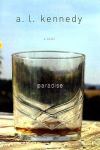 A. L. Kennedy’s Paradise (Knopf, 2004) explores the tragic descent of Hannah Luckraft, an alcoholic. Several critics have interpreted Paradise through the stations of the cross. I find this reading quite compelling—its fourteen parts may indeed parallel the Via Dolorosa. For me, however, Kennedy’s narrative describes something much closer to home—what few religious texts ever manage to convey within the limits of philosophical and theological discourse: a complex portrait of the individual will enslaved by desire.
A. L. Kennedy’s Paradise (Knopf, 2004) explores the tragic descent of Hannah Luckraft, an alcoholic. Several critics have interpreted Paradise through the stations of the cross. I find this reading quite compelling—its fourteen parts may indeed parallel the Via Dolorosa. For me, however, Kennedy’s narrative describes something much closer to home—what few religious texts ever manage to convey within the limits of philosophical and theological discourse: a complex portrait of the individual will enslaved by desire.
Paradise requires the reader to explore the dark recesses of the soul through its train-wreck central character, Hannah. Existential confusion and sensory overload pervade the book: “He gets me another whisky and then one of its relatives, and then one of its friends and I should be drunk by now, I should be feeling it, I should—in the absence of other pleasures—be in my house with the whole whisky family, all of us curled up tight around our fine, warm, cask-matured, internal fire. But I’m not. I am entirely sober. I can hear owls snatching mice in the park behind us . . . My skin is unbearable, it is holding me back, holding me in and the shine of his body is hurting it, turning so intense that I ought to be seeing blisters rise and he’s so far away across the table and talking about I have no idea what—he’s too close to hear, drowned out by the babies crying across the river and changing their minds and dreaming, dreaming loud as hand grenades—and why is he so warm when I can’t touch him?” (44).
Kennedy has a knack for describing sensory experience. The effect is profound and brings to mind one of the darkest portraits of the self in Western literature. Augustine famously wrote of the consuming power of self in Confessions—“It was foul, and I loved it. I loved my own undoing. I loved my error—not that for which I erred but the error itself” (Book 2.4).
Augustine’s account of the soul enslaved by sin, however, differs considerably from Kennedy’s Paradise. While Augustine found redemption in the spoken words of a child, Tolle lege, tolle, lege (“Take and read; take and read”), Hannah’s journey entails a cycle of devolution. Despair alone remains.
As any reader of Dante knows, this is no Paradise. It is Inferno.